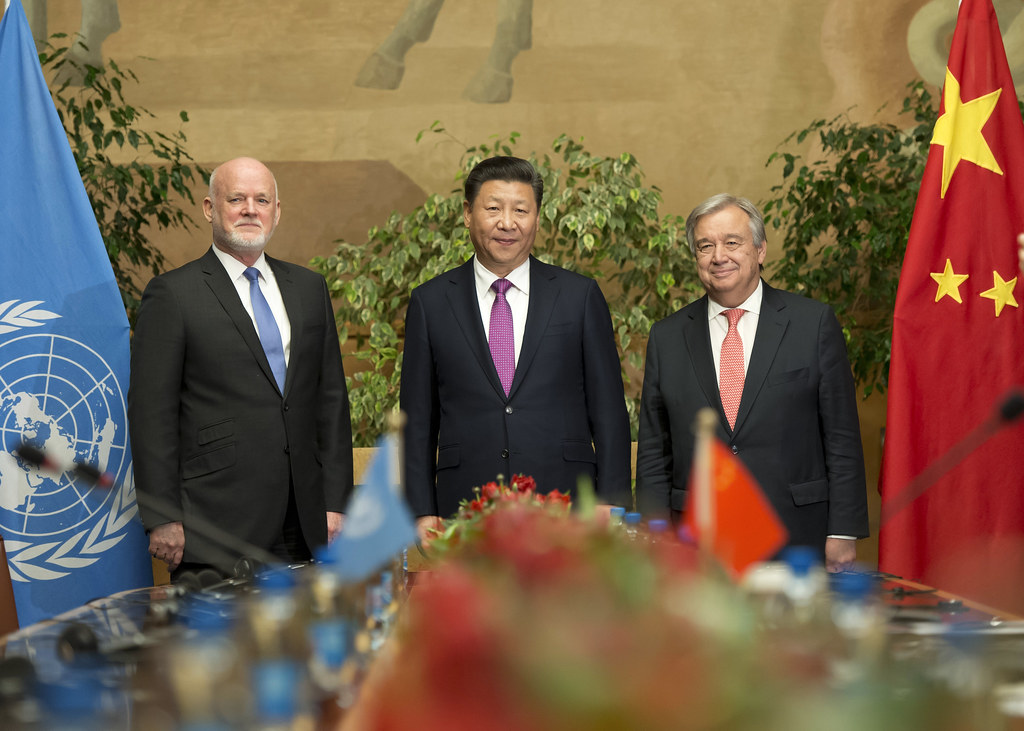PRESS RELEASE: Uyghur Congress Deeply Troubled by China’s Recent Unfounded Assertions at UN Office at Geneva
 Secretary-General Ant?nio Guterres (right) and Peter Thomson (left), President of the seventy-first session of the General Assembly, with Xi Jinping, President of the People’s Republic of China, during the Chinese president?s visit to the UN Office at Geneva (UNOG).
Secretary-General Ant?nio Guterres (right) and Peter Thomson (left), President of the seventy-first session of the General Assembly, with Xi Jinping, President of the People’s Republic of China, during the Chinese president?s visit to the UN Office at Geneva (UNOG).
Press Release – For immediate release
27 August 2019
Contact: World Uyghur Congress www.uyghurcongress.org
+49 89 5432 1999 or [email protected]

The Chinese delegation recently circulated a Note Verbale to UN Member States in Geneva, repeating unsubstantiated claims that WUC President, Dolkun Isa, is a “notorious anti-China secessionist and terrorist” and that the WUC supports violence. The letter goes on to discourage Member States from meeting with Mr. Isa or his associates.
The claims are groundless; the Chinese government has not responded to countless requests from the WUC and other groups to provide the basis for these unfounded allegations. It is worth recalling the Interpol Red Notice previously attached to Mr. Isa that was deleted in 2018, following work by Fair Trials, who determined that the charges were purely the result of China’s use of the organization to target critics.
Isa, speaking from Geneva in response to the letter said that, “It is no surprise that China continues desperately to try to silence mere conversation about their appalling treatment of Uyghurs.”
Continuing, Isa remarked that, “It shows clearly how deeply nervous the Chinese government is about activists speaking about the reality on the ground. We have an obligation to continue to speak honestly and transparently about it.”
It is no surprise that China continues desperately to try to silence mere conversation about their appalling treatment of Uyghurs.
Dolkun Isa, WUC President
The assertions in the letter, however, aim to do serious damage to the work of activists and campaigners who have consistently worked for years to raise and address the abuse of the Uyghur population.
Such claims seek to intimidate individuals and groups who aim to protect and promote human rights. They run counter to international standards and warrant an immediate response from the UN human rights system.
Smearing critics is not a new tactic—it stands as the latest attempt to silence credible, critical voices on human rights in China, particularly those working on Uyghur and Tibetan issues. It also shows an unwillingness to engage in constructive dialogue or engagement to improve the conditions on the ground for Uyghurs. Such behaviour by China has been long documented at the Human Rights Council and elsewhere.
Furthermore, by attempting to block channels of communication and openly intimidate UN Member states, China is illustrating that facts and evidence are merely a threat to its ongoing approach to the Uyghur population.
The letter goes on to urge UN Member States to “act in accordance with the Charter of the United Nations and the international law.”
Article 1 of the Charter calls on states to, “promot[e] and encourage[e] respect for human rights and for fundamental freedoms for all without distinction as to race, sex, language, or religion.” One needn’t look much further than the arbitrary detention of 1-3 million Uyghurs and other Turkic Muslims on the basis of their ethnic identity – constituting not simply a failure to respect rights, but potentially crimes against humanity – to illustrate China’s own misunderstanding of the institution it claims to respect.
The WUC has, since its founding, consistently acted with professionalism and respect for international norms, and engaged in advocacy as a means of giving a voice to the increasingly voiceless Uyghur population.
We will nevertheless continue to promote the right of the Uyghur people to use peaceful, nonviolent, and democratic means to determine their political future.
We strive to uphold these principles in everything that we do and would welcome further open and transparent communication with interested states.

